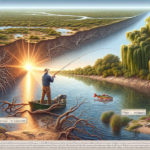Fishing in the Tennessee River: Lakes, Reservoirs, and Streams

Introduction
Did you know that the Tennessee River is home to over 230 species of fish, making it one of the most biodiverse river systems in North America? Whether you’re a seasoned angler or a novice looking to cast your first line, the Tennessee River offers a plethora of fishing opportunities that cater to all skill levels. This article will delve into the various aspects of fishing in the Tennessee River, including its lakes, reservoirs, and streams. We’ll cover the best fishing techniques, species information, top fishing spots, seasonal considerations, and much more.
Understanding the intricacies of fishing in the Tennessee River is crucial for anyone looking to make the most of their angling experience. From finding the best fishing spots to mastering specific techniques, this guide aims to equip you with all the knowledge you need for a successful fishing trip.
Background/Context
Historical or Cultural Significance
The Tennessee River has long been a vital resource for the communities that surround it. Historically, it served as a major transportation route for Native American tribes and early European settlers. The river’s rich biodiversity has also made it a focal point for conservation efforts. Fishing has been a part of the local culture for generations, contributing to both the economy and the way of life in the region.
Geographical Overview
The Tennessee River spans approximately 652 miles, flowing through Tennessee, Alabama, Mississippi, and Kentucky. The river’s watershed includes a variety of ecosystems, from mountainous regions to fertile valleys. The climate in the region is generally temperate, with hot summers and mild winters, making it an ideal location for year-round fishing.
Key Points/Details
Fishing Techniques
Technique Overview
Several fishing techniques are effective in the Tennessee River, including fly fishing, baitcasting, and trolling. Each technique has its own set of advantages and is suited to different types of fish and water conditions.
When and Where to Use
Fly fishing is particularly effective in the river’s streams and smaller tributaries, especially for catching trout. Baitcasting is ideal for targeting larger species like bass and catfish in the river’s lakes and reservoirs. Trolling is often used in deeper waters to catch species like walleye and striped bass.
Recommended Gear
- Fly Fishing: A 5-6 weight rod, floating line, and a variety of dry flies and nymphs.
- Baitcasting: A medium-heavy rod, baitcasting reel, and lures such as crankbaits and spinnerbaits.
- Trolling: A heavy-duty rod, trolling reel, and deep-diving lures or live bait.
Species Information
Species Overview
The Tennessee River is home to a wide variety of fish species, including largemouth bass, smallmouth bass, catfish, crappie, and trout. Each species has its own unique habits and preferred habitats.
Best Practices
For largemouth bass, focus on areas with heavy cover such as submerged logs and vegetation. Smallmouth bass are often found in rocky areas with strong currents. Catfish prefer deeper waters with slow-moving currents, while crappie are usually found near submerged structures like brush piles. Trout are typically found in cooler, fast-flowing streams.
Location Information
Top Fishing Spots
- Pickwick Lake: Known for its excellent bass fishing, with numerous access points and amenities.
- Guntersville Lake: Offers a variety of fish species and is a popular spot for tournaments.
- Chickamauga Lake: Famous for its record-breaking largemouth bass.
- Hiwassee River: A prime location for trout fishing, especially in the cooler months.
Regulations and Licenses
Fishing regulations in the Tennessee River vary by state and specific water body. Anglers are required to have a valid fishing license, which can be obtained online or at local retailers. It’s important to check local regulations for catch limits, size restrictions, and seasonal closures.
Seasonal Considerations
Seasonal Variations
Fishing conditions in the Tennessee River change throughout the year. Spring and fall are generally the best seasons for fishing, as water temperatures are ideal for most species. Summer can be productive but may require fishing during early morning or late evening to avoid the heat. Winter fishing is possible but often requires specialized gear and techniques.
Best Times to Fish
The optimal times for fishing in the Tennessee River are early morning and late evening, especially during the warmer months. Seasonal peaks for different species vary, so it’s essential to research the best times for your target fish.
Events and Tournaments
Event Overview
The Tennessee River hosts several fishing tournaments throughout the year, including the Bassmaster Elite Series and local bass fishing competitions. These events attract anglers from all over the country and offer substantial prizes.
Preparation Tips
To prepare for a fishing tournament, ensure your gear is in top condition and practice your techniques in similar water conditions. Familiarize yourself with the tournament rules and scout the fishing area beforehand to identify potential hotspots.
Tips and Best Practices
General Tips
- Always check the weather forecast before heading out.
- Use local bait and lures to increase your chances of success.
- Practice catch and release to help maintain fish populations.
Avoid Common Mistakes
- Not checking local regulations can result in fines.
- Using the wrong gear for the target species can lead to frustration.
- Ignoring seasonal variations can result in poor catches.
Advanced Techniques
- Using fish finders to locate schools of fish in deeper waters.
- Mastering the art of fly tying to create custom flies that mimic local insects.
- Employing advanced casting techniques to reach difficult spots.
Gear and Equipment Recommendations
Essential Gear
- Fishing rod and reel suited to your target species.
- Appropriate fishing line and leader material.
- A variety of lures and baits.
- Fishing license and any required permits.
Optional Gear/Upgrades
- Fish finder or sonar device.
- High-quality polarized sunglasses to reduce glare.
- Waterproof tackle box.
Where to Buy or Rent
Local bait and tackle shops in towns along the Tennessee River offer a wide range of gear and equipment. Online retailers like Bass Pro Shops and Cabela’s also provide extensive selections. Some locations may offer rental options for larger equipment like boats and trolling motors.
Safety and Conservation
Safety Tips
- Always wear a life jacket when fishing from a boat.
- Be aware of weather conditions and seek shelter if necessary.
- Keep a first aid kit and emergency supplies on hand.
Conservation Practices
- Practice catch and release to help sustain fish populations.
- Respect local wildlife and avoid disturbing natural habitats.
- Follow all local regulations and guidelines.
Planning Your Trip
Accommodations
There are numerous lodging options near the Tennessee River, ranging from campgrounds and RV parks to hotels and vacation rentals. Popular areas like Guntersville and Pickwick Lake offer a variety of accommodations to suit different budgets.
Travel Tips
The Tennessee River is accessible by car from major cities like Nashville, Chattanooga, and Huntsville. If you’re flying in, the closest major airports are Nashville International Airport (BNA) and Huntsville International Airport (HSV). Renting a car is recommended for easy access to various fishing spots.
Additional Activities
In addition to fishing, the Tennessee River region offers a range of outdoor activities such as hiking, boating, and bird watching. Historical sites and local attractions provide entertainment for non-fishing members of your group.
Frequently Asked Questions (FAQs)
Do I need a fishing license to fish in the Tennessee River?
Yes, a valid fishing license is required. Licenses can be purchased online or at local retailers.
What are the best times of year to fish in the Tennessee River?
Spring and fall are generally the best seasons, but fishing can be productive year-round with the right techniques and gear.
What types of fish can I catch in the Tennessee River?
The river is home to a variety of species, including largemouth bass, smallmouth bass, catfish, crappie, and trout.
Are there any fishing tournaments held on the Tennessee River?
Yes, several tournaments are held throughout the year, including the Bassmaster Elite Series and local competitions.
Conclusion
Fishing in the Tennessee River offers a unique and rewarding experience for anglers of all skill levels. From its rich biodiversity to its scenic landscapes, the river provides numerous opportunities for successful fishing trips. By understanding the best techniques, species habits, and top fishing spots, you can make the most of your time on the water. Whether you’re preparing for a tournament or planning a leisurely fishing trip, this guide has all the information you need to ensure a memorable and productive experience.
So grab your gear, head to the Tennessee River, and enjoy the thrill of fishing in one of North America’s most diverse and beautiful river systems.




